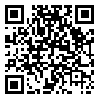Volume 10, Issue 2 (2025)
IJMPP 2025, 10(2): 1195-1201 |
Back to browse issues page
Research code: 1402-17996
Ethics code: IR.MAZUMS.IMAMHOSPITAL.REC.1402.102
Clinical trials code: IRCT20230930059559N1
Download citation:
BibTeX | RIS | EndNote | Medlars | ProCite | Reference Manager | RefWorks
Send citation to:



BibTeX | RIS | EndNote | Medlars | ProCite | Reference Manager | RefWorks
Send citation to:
Kazemi S S, Ranjbar M, Naghibi S A, Khazaei-poul G, Shayesteh Azar M. Remote Education based on Self-Efficacy Theory (RESET): A randomized trial protocol to reduce health worker burnout with occupational back pain. IJMPP 2025; 10 (2) :1195-1201
URL: http://ijmpp.modares.ac.ir/article-32-80118-en.html
URL: http://ijmpp.modares.ac.ir/article-32-80118-en.html
Seyedeh Somayeh Kazemi *  1, Mansour Ranjbar2
1, Mansour Ranjbar2  , Seyed Abolhassan Naghibi3
, Seyed Abolhassan Naghibi3  , Golnush Khazaei-poul4
, Golnush Khazaei-poul4  , Masoud Shayesteh Azar5
, Masoud Shayesteh Azar5 
 1, Mansour Ranjbar2
1, Mansour Ranjbar2  , Seyed Abolhassan Naghibi3
, Seyed Abolhassan Naghibi3  , Golnush Khazaei-poul4
, Golnush Khazaei-poul4  , Masoud Shayesteh Azar5
, Masoud Shayesteh Azar5 
1- 1. Department of Health Education & Promotion, Faculty of Health, Mazandaran University of Medical Sciences, Sari, Iran.2. Orthopedic Research Center, Sari Imam Khomeini Hospital, Mazandaran University of Medical Sciences, Sari, Iran. , somayeh.kazemi7@gmail.com
2- Department of Education Development Center (EDC), Mazandaran University of Medical Sciences, Sari, Iran.
3- Department of Health Education & Promotion, Faculty of Health, Mazandaran University of Medical Sciences, Sari, Iran.
4- Unit of Health Education, Health Network, Mazandaran University of Medical Sciences, Chalus, Iran
5- Department of Orthopedics, School of Medicine, Orthopedic Research Center, Sari Imam Khomeini Hospital, Mazandaran University of Medical Sciences, Sari, Iran.
2- Department of Education Development Center (EDC), Mazandaran University of Medical Sciences, Sari, Iran.
3- Department of Health Education & Promotion, Faculty of Health, Mazandaran University of Medical Sciences, Sari, Iran.
4- Unit of Health Education, Health Network, Mazandaran University of Medical Sciences, Chalus, Iran
5- Department of Orthopedics, School of Medicine, Orthopedic Research Center, Sari Imam Khomeini Hospital, Mazandaran University of Medical Sciences, Sari, Iran.
Abstract: (193 Views)
Aims: Back pain significantly impacts healthcare providers, causing absenteeism, disability, and burnout. Improving self-efficacy is crucial for job performance and skill development, highlighting the need for targeted interventions to reduce burnout in healthcare settings. This study examines the effectiveness of a remote educational intervention based on self-efficacy theory in alleviating job burnout among healthcare workers with back pain in the Chalus health network.
Methods and Materials: This randomized clinical trial will proceed in three phases. The first phase involves a cross-sectional study to assess back pain, occupational burnout, and self-efficacy among participants. The second phase focuses on designing an electronic educational program. In the third phase, this program will be implemented for the target group. The educational program's impact will be evaluated at two time points: before the intervention and three months post-intervention. Data collection will utilize demographic checklists, Visual Analog Scale, Maslach Burnout Inventory, and Schwarzer's General Self-Efficacy Scale. Participants will be healthcare workers from the Chalus Health Network, randomized into intervention and control groups. Data will be analyzed using SPSS-23 with descriptive and analytical statistical tests.
Conclusion: The RESET program has significant public health implications, particularly in reducing burnout among healthcare workers suffering from back pain. By applying self-efficacy principles and remote education techniques, RESET can alleviate both physical and psychological stress. Implementing this program more broadly could enhance workforce well-being, job satisfaction, and the quality of patient care. The findings may also inform future public health initiatives aimed at improving occupational health among healthcare professionals.
Methods and Materials: This randomized clinical trial will proceed in three phases. The first phase involves a cross-sectional study to assess back pain, occupational burnout, and self-efficacy among participants. The second phase focuses on designing an electronic educational program. In the third phase, this program will be implemented for the target group. The educational program's impact will be evaluated at two time points: before the intervention and three months post-intervention. Data collection will utilize demographic checklists, Visual Analog Scale, Maslach Burnout Inventory, and Schwarzer's General Self-Efficacy Scale. Participants will be healthcare workers from the Chalus Health Network, randomized into intervention and control groups. Data will be analyzed using SPSS-23 with descriptive and analytical statistical tests.
Conclusion: The RESET program has significant public health implications, particularly in reducing burnout among healthcare workers suffering from back pain. By applying self-efficacy principles and remote education techniques, RESET can alleviate both physical and psychological stress. Implementing this program more broadly could enhance workforce well-being, job satisfaction, and the quality of patient care. The findings may also inform future public health initiatives aimed at improving occupational health among healthcare professionals.
Article Type: Original Research |
Subject:
Occupational Therapy
Received: 2025/03/25 | Revised: 2025/07/12 | Accepted: 2025/06/8 | Published: 2025/06/22
Received: 2025/03/25 | Revised: 2025/07/12 | Accepted: 2025/06/8 | Published: 2025/06/22
Send email to the article author
| Rights and permissions | |
 |
This work is licensed under a Creative Commons Attribution-NonCommercial 4.0 International License. |






